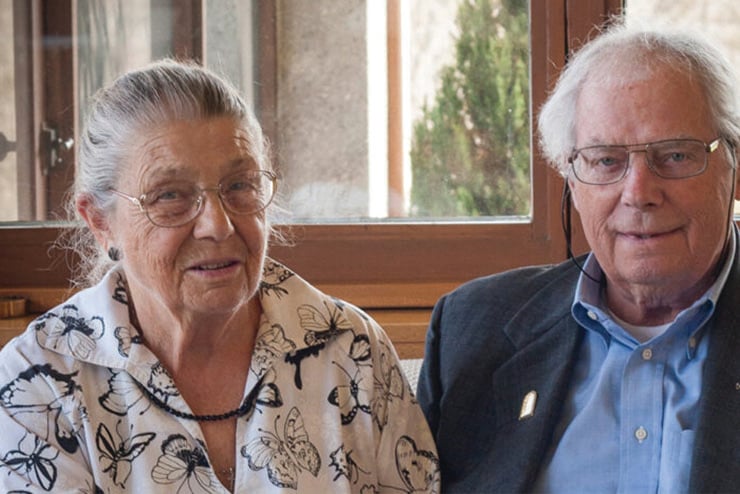Grounded in Middle America
Serving on the board of Chronicles: A Magazine of American Culture is a joy because of the relationships between its members. Sadly, when Mary Kohler passed away last spring, we lost one of the board’s great longtime members and a friend to Chronicles. She and her husband Terry hosted many board retreats at Windway, the family’s historic house near Kohler, the town founded around their family’s manufacturing company.
Mary was raised in the same town in which Chronicles was founded, Rockford, Illinois, a major manufacturing center and what became ground zero for one of the major consequences of the globalization of the United States: deindustrialization. She earned a geology degree from the University of Wisconsin, Madison; as a fellow geologist, this shared interest cemented our friendship.
Thomas Fleming, Chronicles Editor-in-Chief for 30 years, likely had Mary in mind when he wrote, “There’s no one wiser than a wise old woman.” For Mary, however, age was just a number, as she possessed high energy and an agile mind. Our board meetings would often include a full-day session of Fleming’s rants on the outrages du jour as well as former Chairman David Hartman’s extended lectures on why Europe’s Value Added Tax was really a tariff by another name. In the afternoons, Mary would rally the troops with a walking tour of the countryside around Windway. A careful student of the natural world, she would share her wealth of knowledge on the types of native plant species, the qualities of the soil nourishing her garden, and the intensity of Eastern Wisconsin’s growing season. It was a welcome second wind to carry us through our meetings and on to dinner, where we would enjoy high talk and higher laughter.
Publishing a principled, thoughtful print magazine like Chronicles is not easy, but the 1990s and 2000s were particularly tough. Its editors and writers had no friends within Conservatism Inc. Chronicles argued against ceaseless foreign wars, open borders, and academic hucksters and pointed out the foibles of offshoring U.S. manufacturing, degrading the environment, deficit spending, and consolidating political and monetary power in Washington, D.C., New York, and in the globalist capitals of Europe. They offered instead hopeful historical examples of how to think and act as free citizens in a republic, properly understood. How to sum it up nicely? Chronicles didn’t exactly follow the zeitgeist of the times.
Many wondered if Chronicles would survive. Who wanted to read about preserving and pursuing the good, the true, and the beautiful in the “little platoons” of America when neoconservatives like George W. Bush speechwriter David Frum, National Review Editor Rich Lowry, and Weekly Standard Editor Bill Kristol were having so much fun and profit attacking the Hitler-of-the-Week and safely snarking about the clownish-but-loveable Republicans?
Rather than joining the bandwagon for foreign wars or piling on easy targets, Chronicles dared to criticize these New York- and D.C.-approved elite “conservatives.” Writing in the pages of Chronicles didn’t exactly meet Dale Carnegie’s definition of winning friends and influencing people—nor was publishing such a pugnacious and uncompromising magazine an easy way to raise funds from the Yes-But-Less conservative crowd.
Chronicles endured those times and emerged perhaps a bit poorer, but with its integrity intact. Since the advent of Donald Trump and America’s populist right, Chronicles has been recognized as having been right all along about where America was and where she was headed. I nearly wrecked my truck in January 2016 when I heard Rush Limbaugh devote an entire show to how Sam Francis predicted the rise of Trump 20 years earlier in Chronicles. Rooted in an understanding of human nature, the analysis one finds in our magazine is timeless.
Through all our struggles, Mary remained a steadying influence. Her Midwestern horse sense and calm resolve induced a sense of balanced confidence within the rest of us. It’s no exaggeration to say that Mary and Terry’s financial and emotional support proved critical to the ultimate success of Chronicles. Terry passed away in September 2016, but Mary soldiered on and would always say how grateful she was for her years with Terry. Together they spent countless hours on charitable pursuits, including ministering to and inspiring hundreds of married couples, as well as saving thousands of endangered birds, including, to my delight, the Whooping Crane, which visits my home in South Texas each winter.
I recently found a card Mary sent me for Epiphany in 2019. “My 90 years have apparently slowed me down,” she wrote, before relaying travels and activities that would overwhelm a much younger woman, including lavishing affection on four great-grandkids under her wing. “I still walk most days, do therapy, cook, read what you send me on the computer and delete lots of junk,” she wrote. She ended by asking me to pray “that Jesus will enter more hearts and bring wise thoughts, good families, health, and charity to all—especially those who are hurting.” On her behalf, I ask our readers to share those prayers as well.



Leave a Reply